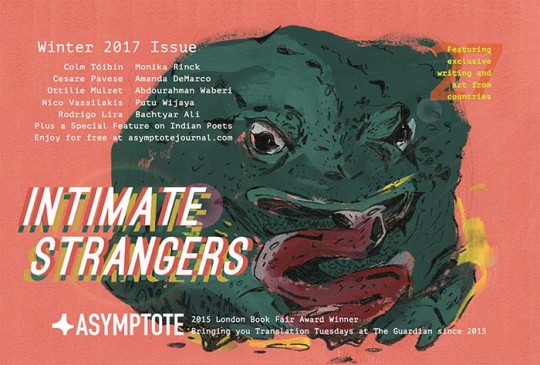Here at the blog, we’ve been mesmerized by the new Winter 2017 Issue since its launch on Monday. We hope you’ve had time to dive in, too, but if not, here are a few great places to start!
“Daland” by Lika Tcheishvili, translated from the Georgian by Ekaterine Chialashvili and Alex Scrivener, is a curious little story, told in the first person by an unnamed dock worker in Bandar Abbas, Iran. Anyone who has seen or read about Lin Manuel Miranda’s Hamilton will find themselves in familiar territory when the narrator becomes the unlikely participant in a duel. Any sense of familiarity stops there, however. The man who challenges him is a mysterious smoker with a perpetually fresh lily—flowers foreign to Bandar Abbas—in his lapel and an appointment with a schooner no one has heard of…
I also cannot get the words of Christiane Singer out of my head. In her essay, “The Feminine, Land of Welcome,” translated from the French by Hélène Cardona, she writes to women, “stand bewitched and ready to leap: the queen, the sister, the lover, the friend, the mother—all those who have the genius for relationship, for welcoming. The genius for inventing life.” She highlights the danger of defining women only by their commonalities, as well as the horrors that could have come to pass—and could still—in a world without women. Their absence would be powerfully felt, even in comparison to situations in which they are already roundly ignored or discredited.
—Madeline Jones, Blog Editor
In “Always Already Translated: Questions of Language in Singaporean Literature”, Boston-born Philip Holden, who has lived in Singapore for more than 20 years, writes lyrically about this multilingual city-state. Having worked with languages Holden mentions—Malay, Malayalam, Javanese, and many others—I loved his description of situations where “I speak in Mandarin to Chinese patients, and they reply not to me but to my Chinese co-worker, who looks back at me in incomprehension. She speaks in Malay to older Chinese and Malay patients, and they reply in Malay not to her but to the third of us, the Indian woman who wears a tudung that marks her out as Muslim and, by a process of mistaken association, Malay.” Multilingual societies are sadly often depicted as wrought with conflict. While language in Singapore is, like everywhere in the world, a political issue, too, Holden focuses on the opportunities it provides for performing and literary arts. We don’t have to search for a common language, he argues—it’s more interesting to find “holes between languages that everyday translation continually fills up”.
I have never read Albanian literature before, however. If you are like me, I can warmly recommend the three poems by Luljeta Lleshanaku, one of the country’s most important writers, as an introduction. Taken from the collection Negative Space and translated by Ani Gjika, the poems describe a simple life: apple trees, a butcher carving meat, “gardens hidden behind houses like sensual neck bites”. But behind each poem is a rotten apple, or cold floors, and getting one’s way without any real gain—poetic realism. Do also have a listen to the translator reading the original text in Albanian!
—Hanna Heiskanen, Blog Editor
Check out the gorgeous video preview of the new issue here:
*****
Read More from the Asymptote team:

